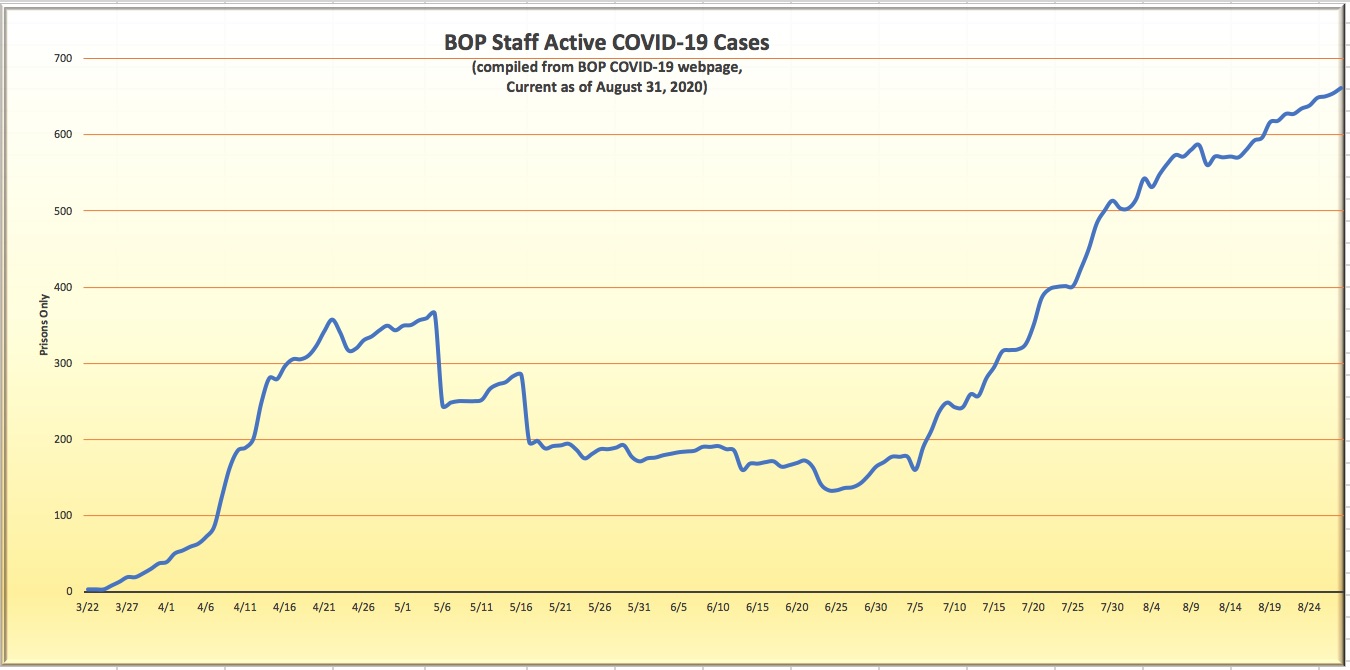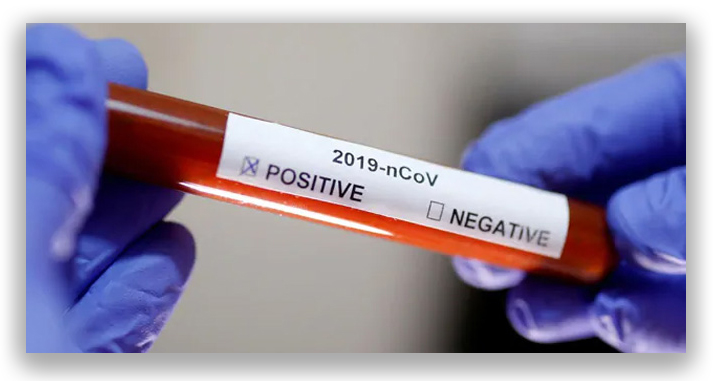We post news and comment on federal criminal justice issues, focused primarily on trial and post-conviction matters, legislative initiatives, and sentencing issues.

COVID-19 SLEEPERS
Is this the new normal? A baseline of 1,500+ COVID-19 inmates, flareups at places where COVID hasn’t gained a foothold before?
As of last night, 1,717 inmates have COVID, up 9% from last week. Sick staff numbered 661, up 5% from a week ago. Two more inmates died, bringing the total to 124, and COVID-19 was present in 112 prisons, 90% of the Bureau of Prisons’ facilities.

Hidden in the data are two disturbing “sleepers.” First, the BOP cannot control COVID-19 among staff. Since hitting a low of 133 sick staffers on June 26, the number of BOP employees COVID-19 has steadily climbed, and is now up 500% in two months.
Perhaps more concerning, only a few days after Hong Kong researchers reported that someone who had recovered from COVID-19 caught it again, a study to appear in The Lancet reported last Thursday that a 25-year old Nevada man had become reinfected as well. He first tested positive for COVID-19 in mid-April, then recovered, but got a more severe case in late May.
Then there is Marie Neba, an inmate at FMC Carswell. She tested positive for COVID-19 on July 3rd. “On Tuesday, August 4, 2020,” according to a BOP press release, “Ms. Neba was considered recovered by medical staff as determined by CDC guidelines.” But eight days later, she was hospitalized coronavirus. She died last Tuesday.
 This is not a first. Last May 10th, FCI Terminal Island declared inmate Adrian Solarzano, who tested positive for COVID-19 in April, to be “recovered following the completion of isolation and presenting with no symptoms… in accordance with [CDC] guidelines.” Five days later, according to a BOP press release, Mr. Solarzano was hospitalized for the COVID-19 he no longer had. He died on May 24th.
This is not a first. Last May 10th, FCI Terminal Island declared inmate Adrian Solarzano, who tested positive for COVID-19 in April, to be “recovered following the completion of isolation and presenting with no symptoms… in accordance with [CDC] guidelines.” Five days later, according to a BOP press release, Mr. Solarzano was hospitalized for the COVID-19 he no longer had. He died on May 24th.
These cases suggest one of three things, none of them good. Either (1) reinfection of recovered COVID-19 patients has been going on far longer than scientists know; or (2) the CDC recovery guidelines are defective; or (3) the BOP is too quick to declare people cured.
Meanwhile, unrest among BOP staff and inmates continues. The Washington Post reported last Monday that Kareen Troitino, president of the Miami correctional officers’ union, “acknowledged that prisoners and guards don’t always find themselves on the same team; but in a pandemic, everyone’s fates are intertwined. ‘All of us are trying to survive,’ Troitino said. ‘Your health affects me, and vice versa. Inmates and staff, we do not feel safe’.”
 Troitino told the Post that “the virus has spread so efficiently through federal facilities because of inconsistent protocols that are almost always reactive rather than preventive… prisoners were only getting tested if they had a fever — a testing threshold that hobbled the early months of the U.S. coronavirus response on the outside, before it spread to prisons.”
Troitino told the Post that “the virus has spread so efficiently through federal facilities because of inconsistent protocols that are almost always reactive rather than preventive… prisoners were only getting tested if they had a fever — a testing threshold that hobbled the early months of the U.S. coronavirus response on the outside, before it spread to prisons.”
“The strain of the virus we got in the facility shows no fever,” Troitino told the Post. “Most inmates complain of extreme low energy, a headache, can’t get out of bed, vomiting, diarrhea.”
As of last night, the BOP has administered enough tests that – if only one to an inmate– would only cover a third of all BOP prisoners. One out of those four tests is coming back positive or COVID.
Latest BOP COVID-19 hotspots, in addition to all of the ones mentioned before, include FDC Seatac and FMC Rochester.
Japan Times, First documented coronavirus reinfection reported in Hong Kong (August 25, 2020)
NBC, COVID-19 reinfection reported in Nevada patient, researchers say (August 28, 2020)
The Lancet (preprint), Genomic Evidence for a Case of Reinfection with SARS-CoV-2 (August 27, 2020)
BOP Press Release, Inmate Death at FMC Carswell (August 26, 2020)
BOP Press Release, Inmate Death at Terminal Island (May 27)
Washington Post, Prisoners and guards agree about federal coronavirus response: ‘We do not feel safe’ (Aug 24)
– Thomas L. Root


 The Clean Slate Act, S.5266, would automatically seal the federal records of individuals convicted of simple drug possession and other low-level, nonviolent crimes involving marijuana, intended “to remove major barriers many Americans face in finding employment, securing housing, and accessing education,” Casey said in a press release. “This legislation would help more than 70 million Americans fully participate in society and provide them with a second chance to contribute to their communities and support their families.”
The Clean Slate Act, S.5266, would automatically seal the federal records of individuals convicted of simple drug possession and other low-level, nonviolent crimes involving marijuana, intended “to remove major barriers many Americans face in finding employment, securing housing, and accessing education,” Casey said in a press release. “This legislation would help more than 70 million Americans fully participate in society and provide them with a second chance to contribute to their communities and support their families.”



